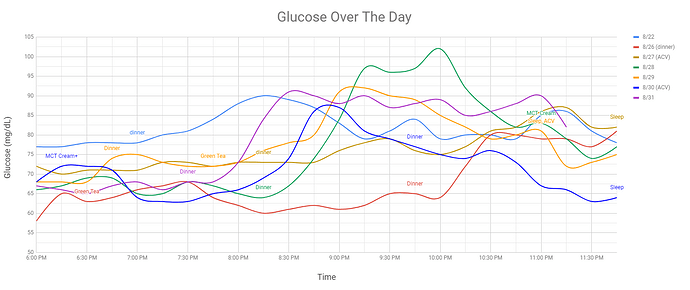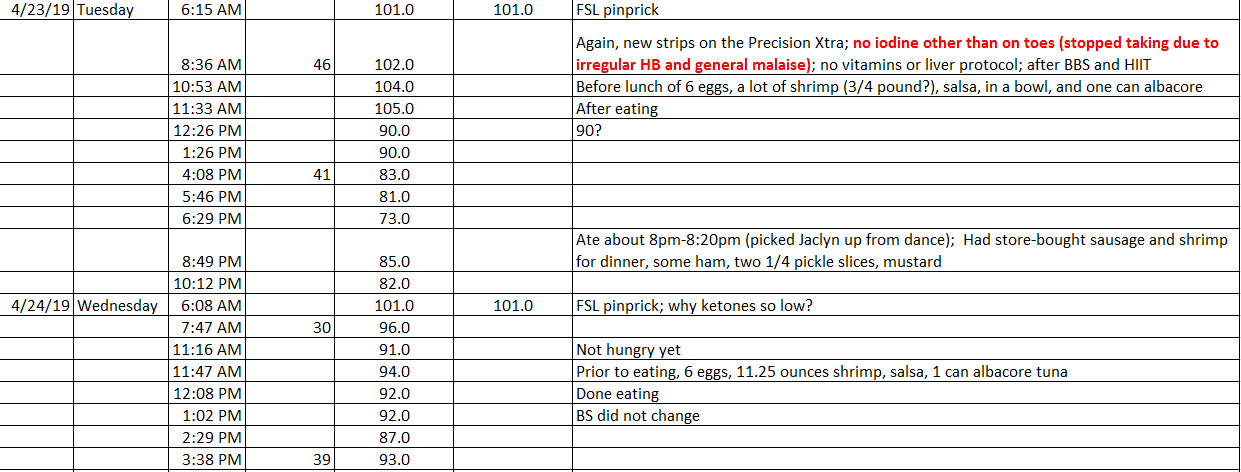Nothing really. Glucose levels can come down from prior as you burn some off, down because of an insulin response, different things make them both go up and down and we are constantly in a state of flux. Only time it really matters is when you catch things spiking you.
Glucose Went Down?
That’s not true. It does matter, always.
According to WebMD:
Insulin can cause cells, including cancer cells, to grow
If you eat, moreso, if you are alive, your blood sugar and insulin are in flux. Without insulin you are DEAD! Many things you do throughout the day effect it all. That goes for most of our bodily functions. Worrying about it moving around a completely ignorable amount is doing more damage to you in stress than anything else. Constant high insulin is a problem, Insulin doing it’s job is not.
I’m not stressing about it.
I’m just trying to figure out if what I drank was a positive thing or negative thing.
I guess the point I was going for is:
Is it better to eat/drink things that make your glucose go up or is it better for it to go down?
@KetoCancerMom In looking at the data you’ve captured (and in attempts to analyze their meaning), I’m afraid we might be confusing accuracy with precision.
Accuracy is the ability to measure something close to its real actual level, whereas precision describes the level of specificity (e.g., number of decimal points).
Measurements can be quite accurate but lack precision (e.g., shooting a bunch of arrows that land closely clustered all around the target’s bullseye, but never hitting dead center). A measure can also be highly precise but terribly inaccurate (a series of arrows landing exactly upon each other - splitting each shaft, one after another… but all are landing in a spot far distant from the intended target bullseye).
So, here’s my personal anecdote:
Recently I took my Keto-Mojo along in the car when I went for a comprehensive metabolic panel blood test. Merely moments after my blood was drawn at the lab, I tested my glucose level with my own meter. Alcohol swabbed clean finger.
First result = 106 mg/dL. Huh? That seemed pretty high for me (typically in the 80-90 range), but I had fasted 14+ hrs for the test, so who knows, maybe a lingering dawn effect?
Okay, so I immediately tested once again. Second result = 94. Hmmm… still kind of high, but so be it. Hey, how come there’s a +10% difference between my glucose tested at the very same time? I guess it arises from the vagaries of the meter, strips, who knows?
A few days later, I received my official lab results. According to LabCorp my glucose at that time (5 minutes previously) had been 89 mg/dL.
TIME SERIES (within 5 minutes)
T0 = 89
T0 = 106
T0 = 94
So in effect, my results were clustered around 90’ish to 100’ish - within about a 10% band.
Perhaps in the scheme of things this is accurate. But it doesn’t seem terribly precise (at least to me).
Your figures above show an apparent trend meandering lower over time of almost -15% from highest to lowest. But I guess I’d chalk up the first 10% worth of meandering to possible measurement imprecision (not inaccuracy).
So trying to draw any serious biochemical or metabolic conclusions from what you’ve seen in your glucose time series seems like it might be a stretch - at least based on the precision of our home measurement tools.
Don’t get me wrong, I’m a bit fan of capturing data (personally, I do it to a fault!) and I don’t mean to rain on the information parade. But I would caution against using imprecise data within normal levels of variability to reach conclusions about what’s going on inside your body in this case.
The good news is - at those levels of ingestion - you seem to be fairly tolerant from a serum glucose standpoint as measured over an hour+ of time. Whether your glucose was dropping in a meaningful way would be difficult to know based on these data.
Then again, if only we had home insulin meters 
The data was captured with my FreeStyle Libre.
I do know that to some extent the data is within an acceptable “range” of accuracy.
However, most times after eating my glucose went up. I just thought it was interesting that my glucose went down the the MCT cream.
I’m sure you’ve done your research and thinking on this, but from what I’ve seen of dairy and IGF and cancer, that seems like a whole lot of cream…
[We got into trouble with this before, so just so it’s clear: I’m not fully up to date on your posts and don’t know if you’ve already gone through this on the forum. There’s no need to take the extra time/writing to fill me in - please don’t even consider it! I’m just posting on the off chance that it’s helpful for you. If not, just ignore  ]
]
I’ve had my glucose go down. In fact, I had basically the same meal for lunch two days in a row, and one day no change and another it went down. See this (using a FS Libre CGM, US model):
One was after exercising, one was not. However, it’s not normal for my blood sugar to decrease after eating. Zero rise, yes, decrease, no. But I tried to replicate this the next day and could not. Maybe it was error on the FSL’s part? (Note: I don’t include blood ketones in this part of the spreadsheet.)
But that’s only 1/2 the equation. For instance, you eat protein, your insulin goes up. That should cause your blood sugar to plummet, right? Not if you have a normal glucagon response, which causes your blood sugar to go back up, leading to a zero (or thereabouts) blood sugar change. I’ve eaten hundreds of grams of protein in a single meal, and not had any change in blood sugar. That’s because I have a normal glucagon response.


